 Today, I have been reading Ernest Hemingway’s A Moveable Feast. He writes about his younger self in Paris, as a writer, living, without much money, on the Left Bank in Paris. I am a writer, just moved here to work for four months, not penniless but living on the Left Bank, for three weeks at an apartment I’ve rented through AirBNB, close to my work.
Today, I have been reading Ernest Hemingway’s A Moveable Feast. He writes about his younger self in Paris, as a writer, living, without much money, on the Left Bank in Paris. I am a writer, just moved here to work for four months, not penniless but living on the Left Bank, for three weeks at an apartment I’ve rented through AirBNB, close to my work.
I think that reading Hemingway in Paris could sound terribly pretentious and immaturely romantic. But the thing is, I really didn’t know much about Hemingway at all. There are a few movies in the last few years that portray him, but neither particularly appealed to me. This book happened to be on the shelf of the apartment, and is slim and appealing.
I’m captivated by the book. He lived just to the east of here, not very far from where I’m staying. The city he describes, apartments across the way with squat toilets, buying bundles of firewood for the apartment he is working in, the horses in the streets and the Bohemian community of ex-pat writers, is very far from Paris of today but the places he lived and ate and wandered are all still here. He writes simply with wry observation of an interesting life. It’s a romantic vision: of working hard at one’s chosen craft of writing, creative success, sexual and romantic passion for his wife, horseracing and boxing, and the colourful figures of his literary and artistic world.
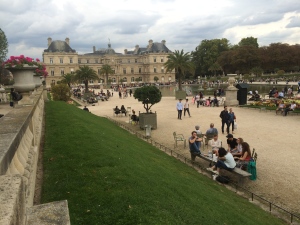 I can see how it has appealed to romantics and writers for many decades, though I wonder about the new generation of writers. How do they match his world up to this current world of writing, of twitter and facebook and blogs, of worldwide bestsellers, and surprise smash success that takes less hard work than marketing smarts and quite a bit of luck? But the thrill of living outside of one’s country wouldn’t have subsided, nor the romance of creative success, or surviving on little money. He writes a number of times of long strolls through les Jardins de Luxembourg, and that’s where I read a chapter or two today, surely the last day of a long summer, early October but so warm it was hot and I’d wished I’d worn a t-shirt instead of a long-sleeve shirt. I don’t imagine Hemingway could have pictured it as it was today, filled with tourists, tennis-players, children on organised pony rides. It was packed.
I can see how it has appealed to romantics and writers for many decades, though I wonder about the new generation of writers. How do they match his world up to this current world of writing, of twitter and facebook and blogs, of worldwide bestsellers, and surprise smash success that takes less hard work than marketing smarts and quite a bit of luck? But the thrill of living outside of one’s country wouldn’t have subsided, nor the romance of creative success, or surviving on little money. He writes a number of times of long strolls through les Jardins de Luxembourg, and that’s where I read a chapter or two today, surely the last day of a long summer, early October but so warm it was hot and I’d wished I’d worn a t-shirt instead of a long-sleeve shirt. I don’t imagine Hemingway could have pictured it as it was today, filled with tourists, tennis-players, children on organised pony rides. It was packed.
Tonight is La Nuit Blanche, an all-night event with art installations and exhibits throughout the city. I feel far too old to stay up all night, though I hope I’ll manage to keep awake until 11pm when I’m to meet a friend who knows one of the visiting artists. We’ll hopefully see his work together.
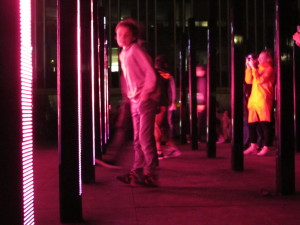 I decided to treat myself to a meal out tonight, and returned to a neighbourhood gem, Au Pied de Fouet, which has apparently been around for 150 years. The food is no frills: simple, honest and very tasty. The waitresses ask you for your order right away, and are brisk and efficient. The tables are cheek to jowl. There is a bank of three tables on one side, that fit four people each, but for people to sit down, the tables have to be moved out or to the side or jostled about. If you are two, or one, as I was tonight, you sit next to other people.
I decided to treat myself to a meal out tonight, and returned to a neighbourhood gem, Au Pied de Fouet, which has apparently been around for 150 years. The food is no frills: simple, honest and very tasty. The waitresses ask you for your order right away, and are brisk and efficient. The tables are cheek to jowl. There is a bank of three tables on one side, that fit four people each, but for people to sit down, the tables have to be moved out or to the side or jostled about. If you are two, or one, as I was tonight, you sit next to other people.
My meal was the simplest fare: a potato salad with apple and chicken, chicken livers with mashed potatoes, and a chestnut cream, that I didn’t know of until I’d ordered it, a thick, rich, sweet chestnut paste served with fresh cream on top of it. I washed this down with one glass of white and two glasses of red. I have a list of over 300 French wines with the designation Appellation d’Origine Contrôlée (AOC), a sort of territorial quality control, and while I was thinking it might be hard to check them all off, if I manage three a night, as I did this evening, I will do just fine.
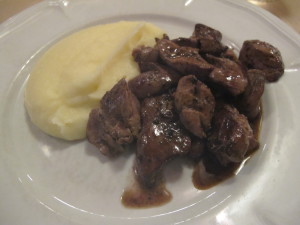 I loved the experience of the restaurant for being so humble and honest. There were a few children in the restaurant, probably regulars, funny, unguarded and loud as children sometimes are. A dog that was in the kitchen at the start of the evening disappeared after the first visitors arrived. It was quiet for the first 20 minutes; I had arrived when it opened. And then, suddenly, it was packed, people upstairs and down. If they arrived without all members of their party, they drank a glass of wine or an aperitif in front of the cash register, not that there really was room there.
I loved the experience of the restaurant for being so humble and honest. There were a few children in the restaurant, probably regulars, funny, unguarded and loud as children sometimes are. A dog that was in the kitchen at the start of the evening disappeared after the first visitors arrived. It was quiet for the first 20 minutes; I had arrived when it opened. And then, suddenly, it was packed, people upstairs and down. If they arrived without all members of their party, they drank a glass of wine or an aperitif in front of the cash register, not that there really was room there.
Two lovely older women next to me started a conversation after I offered to pour them tap water from a bottle on the table. They had wandered by the restaurant on their way to see La Nuit Blanche exhibits. One recommended a restaurant where they candy vegetables right in front of you for dinner at a reasonable price. I’ll try it when I can.
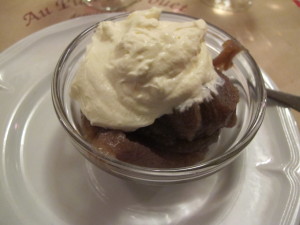 The host started doing a joke voice before I left, a low and gutteral sound, I’m not sure what the routine implied, but with the dog and the children I thought it all hilarious and told him so, and he gave me a splash of cognac to drink and insisted I take not one but a handful of business cards to give to my Canadian friends. Somehow, when I said I was from Canada, he guessed Vancouver immediately. While I’d planned to explore the art immediately, the weather suddenly became chilly, so I’ve dropped by the apartment to grab something warmer. And now off to La Nuit Blanche I go.
The host started doing a joke voice before I left, a low and gutteral sound, I’m not sure what the routine implied, but with the dog and the children I thought it all hilarious and told him so, and he gave me a splash of cognac to drink and insisted I take not one but a handful of business cards to give to my Canadian friends. Somehow, when I said I was from Canada, he guessed Vancouver immediately. While I’d planned to explore the art immediately, the weather suddenly became chilly, so I’ve dropped by the apartment to grab something warmer. And now off to La Nuit Blanche I go.
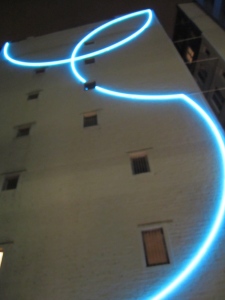 Before I’d visited Paris for the first time, I received the one and only postcard ever from Sandra, a literary Irishwoman from my college, dramatic and brainy, who none of us ever heard from again. She wrote, ‘Paris is a moveable feast’, and while I looked it up to see it was from Hemingway’s book, I don’t think I ever properly looked up the quotation in full:
Before I’d visited Paris for the first time, I received the one and only postcard ever from Sandra, a literary Irishwoman from my college, dramatic and brainy, who none of us ever heard from again. She wrote, ‘Paris is a moveable feast’, and while I looked it up to see it was from Hemingway’s book, I don’t think I ever properly looked up the quotation in full:
‘If you are lucky enough to have lived in Paris as a young man, then wherever you go for the rest of your life it stays with you, for Paris is a moveable feast.’
It’s funny to read it now. I certainly love the ring of the phrase, ‘moveable feast’, as it implies that Paris is a feast, and its liveliness is in motion. But seeing the quote properly, Hemingway uses moveable not in this way: Paris is a feast, and that feast can be transported in your mind to other places… though with another disclaimer: if you are lucky enough to have lived in Paris as a young man.
Perhaps the quote became popular because it was inaccurate, and that Paris remains in the minds of even those who have not lived here, or are not young. I’m only one week into my sojourn here and think this city will be staying with me for a long time.
By chance, the New York Times has published an article about Hemingway this week that reminds me of his sad end, the enjoyable drinking of his Paris days turned to alcoholism, the happy times written about in A Moveable Feast something that was finite and later in life, longed for and romanticised, perhaps in a desperate way.
Perhaps the sentiment of the phrase and quote can be completely separate from Paris itself, and instead refer to anything that is lost and longed for, a happiness unsustainable and the loss of innocence when you know it is so.
